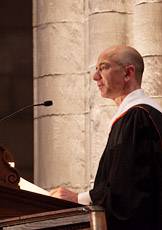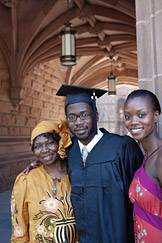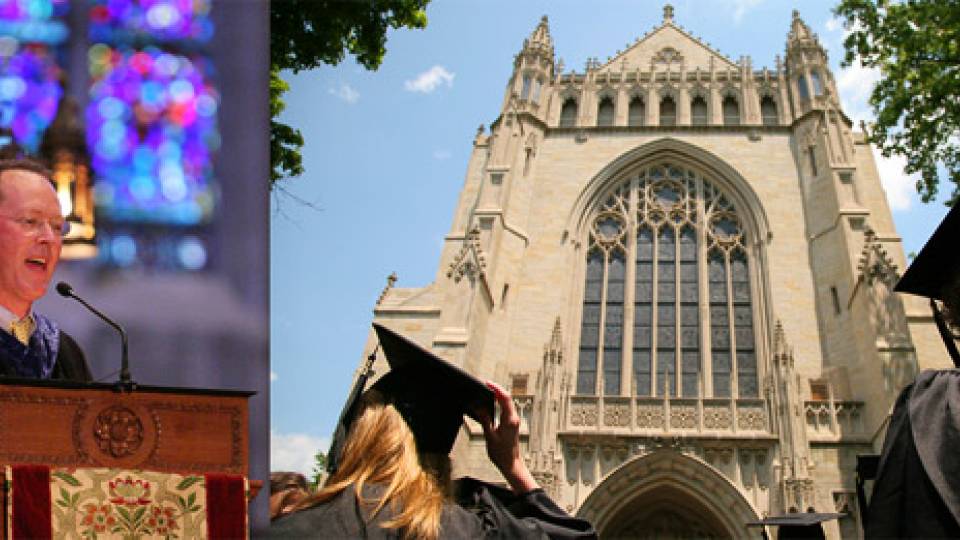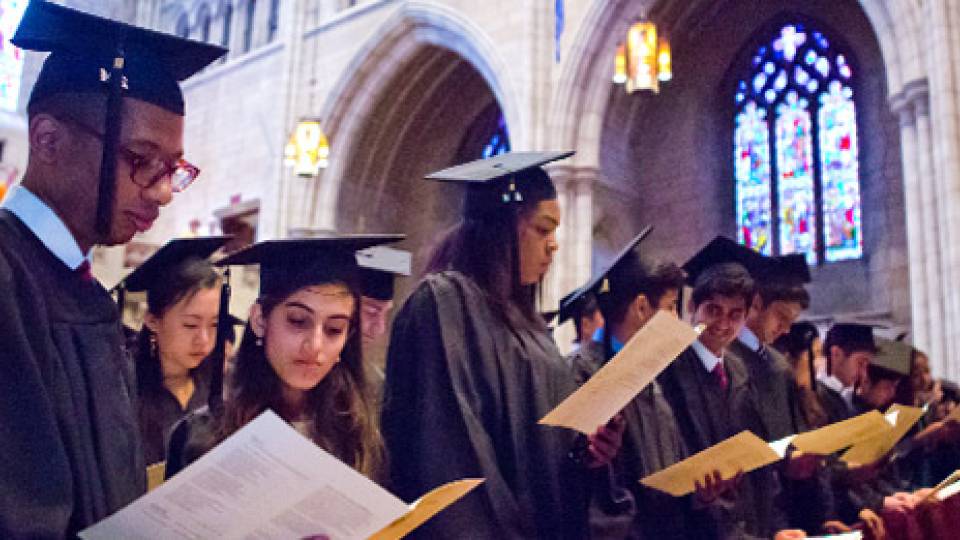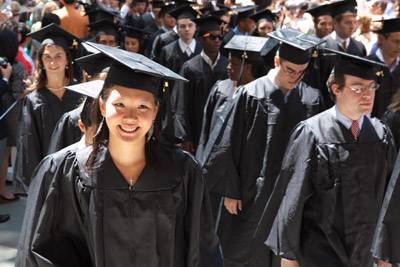
Members of the class of 2010 enter the University Chapel for the Baccalaureate service, an interfaith worship service that is one of Princeton's oldest traditions.
The founder and chief executive officer of the major Internet retailer Amazon.com made an impassioned plea to Princeton's graduating seniors on May 30 to pay close attention to the choices they make in life, as they will dictate not only success, but happiness.
"When you are 80 years old, and in a quiet moment of reflection narrating only for yourself in the most personal version of your life story, the telling that will be the most compact and meaningful will be a series of choices you have made," said Jeff Bezos, a 1986 Princeton alumnus, speaking at this year's Baccalaureate ceremony. "In the end, we are our choices."
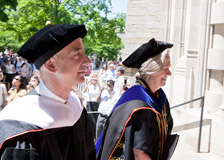
Amazon.com founder Jeff Bezos enters the University Chapel with Princeton President Shirley M. Tilghman for the University's 263rd Baccalaureate ceremony.
Bezos spoke slowly and emphatically, almost as if he were engaging in a heart-to-heart with each graduate at the ceremony, which is an interfaith worship service, and one of Princeton's oldest traditions. He related an emotional incident from his childhood that drove home for him the lesson about the power inherent in making right -- and wrong -- decisions.
On a long road trip with his beloved grandparents, a 10-year-old Bezos decided to impress his grandmother with his talents for calculations, informing her that her intensive cigarette smoking would take nine years off her life. When instead of praising his mathematical prowess, she wept, his grandfather took him aside and gave him one of the great lessons of his life.
"My grandfather looked at me, and after a bit of silence he gently and calmly said, 'Jeff, one day you'll understand that it's harder to be kind than clever,'" Bezos said. Cleverness is a gift, Bezos told the graduates, and kindness is a choice. "You can seduce yourself with your gifts if you're not careful, and if you do, it'll probably be to the detriment of your choices," he said.
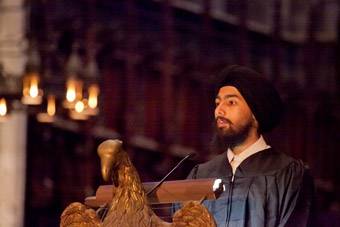
Karambir Khangoora was one of several seniors who read during the service, which included prayers and readings from various religious and philosophical traditions.
Gazing at the students, Bezos acknowledged the group's giftedness and envisaged that those talents would be employed by many coming marvels. "We'll invent ways to generate clean energy and a lot of it," Bezos predicted. "Atom by atom, we'll assemble small machines that will enter cell walls and make repairs." Alluding to recent advances in synthetic biology, he said those experiments would probably continue to the point where humankind will not only synthesize life, "we'll engineer it to specifications." It may even come to pass, he said, that science will bring society to the verge of fully understanding the human brain.
"Jules Verne, Mark Twain, Galileo, Newton -- all the curious from the ages would have wanted to be alive right now," Bezos said.
The coming opportunities, he said, will require the world's future innovators to employ their gifts and make important choices. "How will you use these gifts?" he said. "And will you take pride in your gifts or pride in your choices?"
Bezos graduated with highest honors and Phi Beta Kappa in electrical engineering and computer science. He founded Amazon.com, now the leading online retailer, in 1994.
Before starting Amazon.com, Bezos worked at the intersection of computer science and finance, helping to build one of the most technically sophisticated quantitative hedge funds on Wall Street for D.E. Shaw & Co. He also led the development of computer systems that helped manage more than $250 billion in assets for Bankers Trust Co.
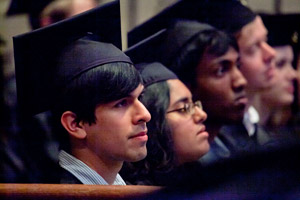
Members of the class of 2010 were solemn during one of the last experiences they would share on campus.
Deciding to start his company 16 years ago was one of the most difficult choices of his life, he said. He had a wonderful job with a great boss and colleagues. But he had an idea that wouldn't go away. He had read that Web usage was growing at 2,300 percent a year. "I'd never seen or heard of anything that grew that fast, and the idea of building an online bookstore with millions of titles -- something that couldn't exist in the physical world -- was very exciting to me," he said.
Bezos' wife, MacKenzie Tuttle Bezos, a 1992 Princeton alumnus, told him she would back him up if he quit and started his company. The audience laughed when Bezos described his boss' reaction. "He took me on a long walk in Central Park, listened carefully to me, and finally said, 'That sounds like a really good idea, but it would be an even better idea for someone who didn't already have a good job,'" Bezos said.
Bezos, however, decided to pursue his passion. And he is proud of his choice.
In her introduction of Bezos, Princeton President Shirley M. Tilghman praised him as "a dreamer and doer, entrepreneur and engineer" and "refreshingly unassuming even in the face of unimaginable success." She also lauded him for "his exceptional ability to marry commerce and technology in creative ways" and "his sheer inventiveness and willingness to take the risks inherent in this process."
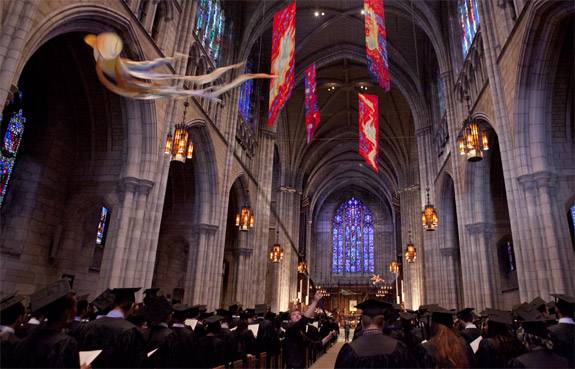
Accompanied by colorful kites, seniors filled the chapel for the Baccalaureate service, which dates back to 1760, when President Samuel Davies addressed the class with remarks titled "Religion and the Public Spirit."
Jack Breslauer, a Woodrow Wilson School senior, said he was touched by Bezos' words. "He was incredibly sincere," Breslauer said. "I really was struck by the fact that a person with his sort of astounding success was urging kindness and consideration of others. It resonated with me."
Tani Brown, a senior religion major, appreciated Bezos' directness and his air of humility. "He was speaking to us as fellow Princeton students," she said. "It's not so much that we shoulder a burden as that we bear a responsibility. And he was speaking to that and reminding us of that."
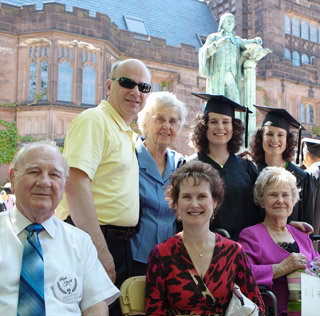
The Schoppe family gathered in the shade outside of East Pyne Hall after the Baccalaureate service to celebrate with their Princeton students, twin sisters Jennifer and Christine.
Princeton's Baccalaureate service is an end-of-the-year celebration focused on members of the senior class. It includes prayers and readings from various religious and philosophical traditions. The earliest recorded Baccalaureate address -- titled "Religion and the Public Spirit" -- was delivered by President Samuel Davies in 1760 to the 11 members of the graduating class. Since 1972, the address has been given by a speaker chosen by the president after discussion with class leaders.
The May 30 service was webcast live and will be available for later viewing. End-of-the-year activities will continue with Class Day on Monday, May 31, and Commencement on Tuesday, June 1.
